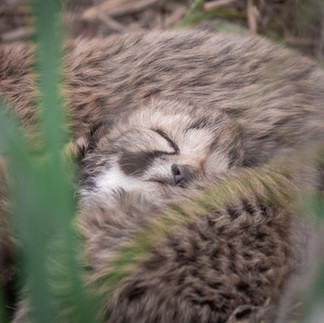Celebrating International Cheetah Day with Remarkable News: Four Cheetah Cubs Born at Abelana Game Reserve 🐆❤️
- LEO Africa
- Dec 4, 2024
- 2 min read

We are thrilled to share the most extraordinary news of the year, coinciding with International Cheetah Day!
On November 26th, a female cheetah we closely monitor at AbelanaGameReserve gave birth to four healthy cubs. This event comes three months after we observed her mating—a milestone we detailed in a previous blog post.
Given the precarious status of cheetahs as an endangered species, with only around 6,500 individuals left in the wild, we kept this news confidential for a week to ensure the highest chances of survival for the cubs.
Around-the-Clock Monitoring for Cheetah Conservation
Since their birth, our dedicated conservation team has worked tirelessly, monitoring the mother and her cubs 24/7. This involves enduring extreme daytime heat exceeding 40°C and braving predators and swarms of mosquitoes at night.
Our primary goal is to ensure the safety of the cubs while protecting the den’s location from any unauthorized access in agreement with the lodge.
We have also taken steps to deter potential predators such as leopards. Every effort we make is rewarded by watching the cubs grow stronger each day.
A Birth in the Wild
The female cheetah gave birth during the heat of the day. On the morning of November 26th, we observed her during a routine check, and by the afternoon, the cubs had made their appearance. One cub was still wet when we discovered them.
Cheetah cubs are born blind, unable to walk, and covered in a distinctive dark fur along their backs and lighter fur on their saddle. There is a theory that this coloration mimics a honey badger’s appearance, possibly to deter predators. It could also well be camouflage or counter-shading though its true purpose remains debated.
Despite this being her first litter, the mother’s instincts have been remarkable. She has stayed devotedly by her cubs, allowing them to suckle at will and relocating them to shaded areas as young cubs cannot yet regulate their body temperature.
After a week, she successfully hunted a male duiker, leaving the cubs alone briefly but under our vigilant observation. Her actions demonstrate a delicate balance of nurturing and survival instincts.
Ethical and Observational Practices
As always, our monitoring approach is ethical and non-intrusive. We maintain a respectful distance, ensuring the cheetah feels safe in our presence. The photos accompanying this article were taken using a high-quality zoom lens, showing our commitment to minimizing disturbance.
In addition to protection, we collect critical data on cheetah behavior and cub rearing. Every detail—movements, separations, potential threats—is logged to contribute to the broader understanding of cheetah conservation.
A Privileged Journey
It is an honor and privilege to witness such a rare event as the birth of wild cheetah cubs. However, the fight for their survival is far from being over, with many challenges ahead.
Our team remains dedicated to giving these cubs the best chance at life.
If you share our passion for conservation and want to be part of this incredible journey, we invite you to join us. Together, we can make a meaningful difference in preserving this magnificent species.
Stay tuned for updates, and please help us spread this wonderful news far and wide!











Comments